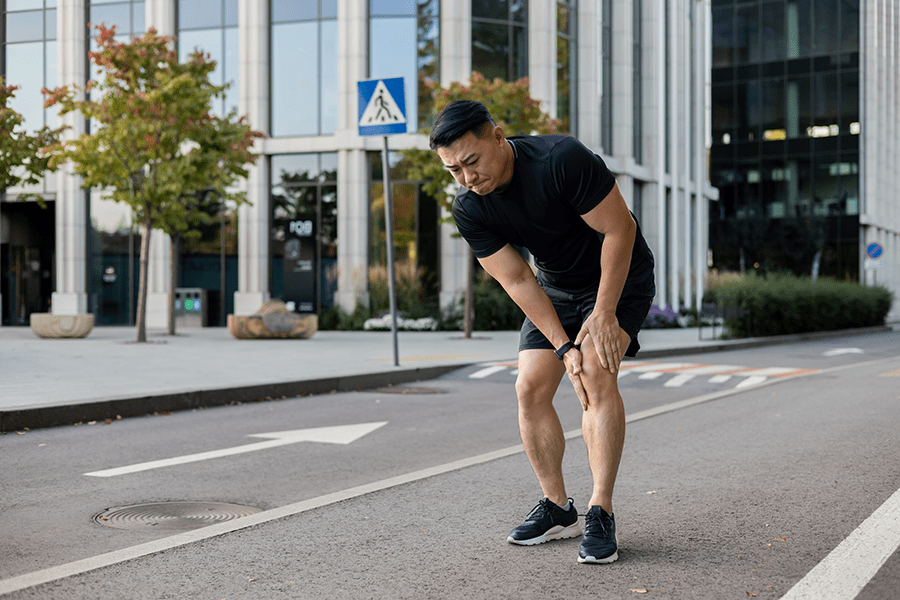Knee pain is often dismissed as a minor inconvenience, but it can signal the gradual wear and tear of one of your body’s most important joints. Many daily habits, ranging from prolonged sitting to poor footwear choices, can slowly damage the knees over time.
Why Your Daily Habits Matter for Knee Health
Your knees are central to movement and stability. They support activities from walking and climbing stairs, to running and lifting. Daily behaviours, even those that seem innocuous, have a cumulative effect on joint health.
Neglecting knee care can allow minor discomfort to progress into persistent pain, reduced mobility, eventually necessitating surgical intervention. Recognising warning signs early and adjusting your habits can reduce the risk of osteoarthritis, cartilage degeneration and other debilitating conditions.
1. Sitting for Long Periods
Prolonged inactivity weakens the muscles that support the knee, such as the quadriceps and hamstrings. Poor circulation during extended sitting can also contribute to stiffness and joint discomfort.
Tip: Stand, stretch, and walk for a few minutes every 30–60 minutes. Even light movement helps maintain joint flexibility and muscle tone.
2. Carrying Excess Weight
Each extra kilogram adds significant stress to the knee joint. Over time, this can accelerate cartilage breakdown and increase the risk of osteoarthritis.
Tip: Avoid carrying heavy loads whenever possible. If needed, use proper lifting techniques or supportive tools to reduce load on your knees and preserve joint function.
3. Skipping Warm-Ups and Cool-Downs
Stiff joints are more prone to injury. Starting physical activity without a proper warm-up can strain ligaments and cartilage, while skipping cool-downs may contribute to post-exercise stiffness.
Tip: Spend five to ten minutes warming up before exercise and cooling down afterwards, focusing on gentle movement and stretching.
4. Wearing the Wrong Shoes
Footwear affects how forces are transmitted up the leg to the knees. Poor arch support or overly flat shoes can misalign the knee joint, while high heels shift your centre of gravity and can place additional stress on the knees.
Tip: Choose supportive, cushioned footwear, particularly during prolonged standing or exercise.
5. Poor Posture When Standing or Walking
Misalignment caused by slouching or uneven weight distribution increases stress on the knees. Over time, this can lead to pain in the knees, hips, and lower back.
Tip: Maintain an upright posture, keep your shoulders back, and distribute weight evenly through both legs.
6. Climbing Stairs or Squatting Excessively
Repeated high-stress movements can exacerbate wear on the patella and cartilage. While these activities are part of daily life, excessive or improper form increases the risk of joint damage.
Tip: Modify movements where possible, take breaks, and use assistive railings to reduce strain.
7. Ignoring Minor Knee Pain
Many people dismiss occasional knee discomfort, assuming it will resolve on its own. This can allow small injuries or inflammation to progress into serious problems that may ultimately require knee surgery.
Tip: Address early pain with rest, ice, and, if needed, professional assessment by a knee specialist. Early intervention often prevents more extensive treatment later.
8. Not Strengthening Supporting Muscles
Weakness in the thighs, hips, and core increases strain on the knees. Imbalanced muscles can alter movement patterns, leading to injury and joint stress.
Tip: Incorporate leg and core exercises into your weekly routine, such as squats with proper form, lunges, and glute or core strengthening exercises.
9. Overtraining or High-Impact Workouts
Intense, repetitive exercise without giving adequate time for recovery can accelerate joint breakdown. Running on hard surfaces or participating in high-impact sports frequently increases the risk of cartilage damage.
Tip: Alternate high-impact workouts with low-impact activities like swimming, cycling, or yoga to allow joints to recover.
10. Poor Lifting Techniques
Improper lifting, such as bending at the waist rather than the knees and hips together, stresses the knee joint and surrounding ligaments. Over time, this can lead to meniscus or ligament injuries.
Tip: Use proper body mechanics— Bend at the hips and knees while keeping your back straight, and lift with controlled movements.
What to Do If You’re Already Experiencing Knee Pain
If you notice persistent knee discomfort, stiffness or swelling, consult a knee specialist. Early assessment can help determine whether non surgical knee pain treatment such as physiotherapy, strengthening exercises, or injections is appropriate. Early intervention often improves outcomes and may prevent the need for surgery.
For a personalised evaluation, book a knee assessment with Alps Orthopaedic.
Will You Need Knee Surgery?
In some cases, progressive knee pain or structural damage may require surgical intervention. Signs that surgery might be necessary include:
- Persistent pain unrelieved by conservative treatments
- Significant instability or difficulty performing daily activities
- Advanced osteoarthritis or cartilage deterioration
Available surgical options at Alps Orthopaedic include arthroscopy, partial knee replacement, and total knee replacement. Robotic-assisted techniques are also offered to improve recovery time.
Change Your Habits, Save Your Knees
Daily choices have a powerful impact on knee health. By addressing sedentary behaviour, wearing proper footwear, strengthening supporting muscles, and paying attention to early warning signs, you can protect your knees for the long term.
However, in severe cases where pain persists, mobility is limited, or joint damage is suspected, it’s important to seek a professional for guidance on the right knee pain management techniques and treatment options to consider in Singapore.
At Alps Orthopaedic, we provide a variety of solutions to provide relief for aching knees, from non-surgical interventions to surgical procedures. Book an appointment with us today to restore and maintain your knee health.

